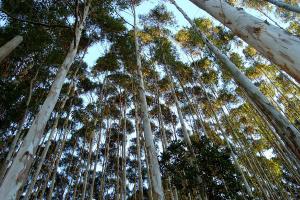Chile is where the “forestry model” introduced into the countries of the South – that is to say large-scale monoculture tree plantations, mainly aimed at producing pulp for export – has been “sold” best.
Large-Scale Tree Plantations
Industrial tree plantations are large-scale, intensively managed, even-aged monocultures, involving vast areas of fertile land under the control of plantation companies. Management of plantations involves the use of huge amounts of water as well as agrochemicals—which harm humans, and plants and animals in the plantations and surrounding areas.
Other information
18 July 2007
Between 1991 and 2001, Shell Renewables -a division of Shell Oil International- implemented a forestry operation based on the planting and harvesting of fast-growing cloned eucalyptus trees (see WRM Bulletin 46), with the aim of establishing a high-yield source of biomass for future energy generation.
Other information
18 July 2007
Extensive areas of PNG’s tropical forests have been cleared to give way to export-oriented oil palm plantations, which have been established under the “Nucleus Estate Smallholder Scheme”. This means that a central company having its own plantation also contracts small farmers to supply it with oil palm fruit. The structure of the Nucleus Estate Smallholder Scheme and the nature of oil palm itself are raising serious concerns amongst civil society.
Bulletin articles
18 July 2007
The race for agrofuels has reached Benin. With heavy support from the government and forming a key part of the “agricultural revival strategy” promoted by the IMF restructuring programme, millions of hectares of agricultural and forest land are to be turned over to agrofuel production for export, with no discussion or concern for the impacts that this will have on the Beninese, their food production and their environment.
Bulletin articles
18 July 2007
In 2002, under the Tenth Plan, the Indian government set the national goal of having 33 percent of the country’s geographic area under “green cover” by 2012. The plan was even presented as part of India’s commitment towards the Millennium Goal on environmental sustainability. However, it is much more about industrial encroachment of forest land for tree plantations.
Action alerts
4 July 2007
The undersigned participants of SBSTTA or of meetings leading up to SBSTTA wish to share their concerns about the issue of genetically modified trees within the process of the Convention of Biological Diversity.
Action alerts
4 July 2007
Paris, France, July 4th 2007 -- Over 50 Indigenous Peoples Organizations and Non-Governmental Organizations involved in meetings surrounding the Convention on Biological Diversity, presented an open letter today recommending a ban on Genetically Modified trees on the basis of their potential impacts on forest biological diversity.
Bulletin articles
19 June 2007
The main aim of the Convention on Biological Diversity (CBD) is the conservation and sustainable use of the world’s biological diversity. It would thus seem obvious that anything that threatens biodiversity should be adequately addressed by signatories to the convention.
Other information
19 June 2007
The certifying firm SGS has launched a consultation process for the FSC certification of Veracel Celulose’s eucalyptus plantations. This company is owned by the Swedish-Finnish company Stora Enso and the Norwegian-Brazilian company Aracruz Celulose and its plantations are established on 78,000 hectares of land in the extreme south of the State of Bahia. The negative impacts of those plantations are resulting in considerable local resistance (see Bulletin No. 109). The main assessment will be made between 23 and 27 July 2007.
Bulletin articles
19 June 2007
With much song and dance, Agro-fuels have quickly found a place on the agendas of the governments of the North…and of the South. They promise energy independence, business, a solution to global warming, business, more foreign currency, business!!!
Bulletin articles
19 June 2007
To the disappointment of some and the relief of others, tree plantation projects, particularly those involving large-scale monocultures, have been struggling to access a new subsidy offered by the Kyoto Protocol’s Clean Development Mechanism: in the three years since the rules for afforestation and reforestation projects were adopted, and after twelve rounds of baseline methodology submissions, only one plantation, in China, has been registered as a CDM project.
Bulletin articles
19 June 2007
Registered on last January 22, the “Project 0143 : UTE Barreiro S.A. Renewable Electricity Generation Project” of Vallourec & Mannesmann (V&M), the world's largest manufacturer of seamless hot-rolled steel tubes, is the third try of the company to get funds under the Clean Development Mechanism (CDM) scheme. The registered project will provide V&M with 67954 carbon credits it can sell to companies in the North who prefer buying such carbon credits to reducing emissions at home.


